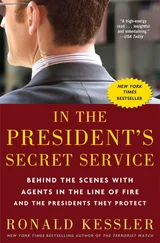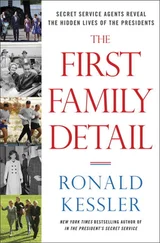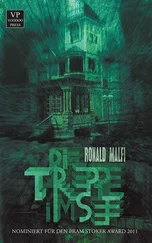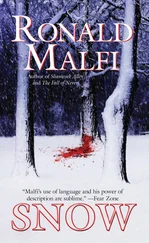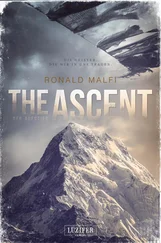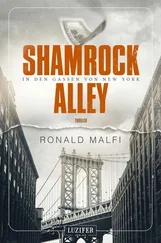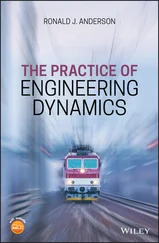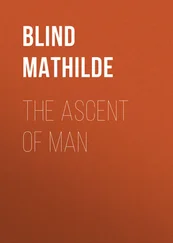complex. That’s how I live my life, really.” He winked conspiratorially and added, “How did you ever think to keep the soldiers’ faces blank?” “Guess I was inspired,” was my response.
That night in bed, I kissed Hannah on the shoulder and told her what the newspaperman had said. I felt her smile in the dark. “So we make a good team, you and me, huh?” she said. “Marry me,” I said.
4
WE WERE NO MORE THAN RN HOUR AWAY FROM
base camp when Donald Shotsky died.
It happened just as twilight deepened the sky to a blend of cool purples and pinks, the moon visible in the eastern sky. For the past half hour, I had been conscious of Shotsky’s breathing—the rasping, closed-throated labor of it—so when it stopped, I was keenly aware of it.
I snapped my head around and saw him ten feet behind me. His eyes were bugging out of their sockets, his mouth working like a fish out of water. One of his pudgy, white hands fluttered in midair. I could almost hear his heartbeat closing the distance between us. I watched as his eyes filmed over, going blind. That fluttering hand clutched his chest. A small, froglike croak issued from his gaping mouth, and a moment after that, he pitched forward face-first into the snow.
I ran to him and dropped to my knees. It took some effort to roll him over on his side, and I knew it wasn’t a good sign that his eyes were still open.
“Andrew!” I could see him about to climb down the far end of the snowy passage to the path below. “Andrew!”
I pushed Shotsky over on his back. He didn’t blink. “Come on, Shotsky,” I pleaded. “Don’t do this.” Pressing two fingers to his carotid, I couldn’t make out a pulse. I quickly commenced with chest compressions, but he was wearing
too much restrictive gear. I unbuckled his pack and opened his coat, then proceeded with more compressions. My breath whistled in my throat, and my pulse drummed in my ears.
“Come on. Come on. Come on. Come on—”
“What happened?” Andrew barked, running toward us.
“Heart attack!”
Like a runner stealing second, Andrew slid in the snow and slammed against one of my thighs. He braced Shotsky’s head and positioned it back on his neck, creating a clearer passageway for air. With one hand, he administered quick little slaps to the side of Shotsky’s face, which was quickly turning a mottled shade of purple.
My arms were getting sore. I counted under my breath and continued with the chest compressions. A trail of snot descended from one of my nostrils and lengthened until it pattered on my balled, pumping fists.
“He’s not breathing,” Andrew said, sitting up. He released Shotsky’s head, but it did not recoil back on its neck. “There’s no pulse.”
“ … seven … eight … nine …”
“There’s no pulse. He’s dead.”
“Come on …”
“Overleigh. Tim.” Andrew put one hand over both my fists and steadied them on Shotsky’s chest. My breath was burning my throat. “He’s dead. It’s over. It’s over.”
Not moving, I sat there for several minutes. Andrew’s hand remained on top of mine. Once I felt my heartbeat begin to slow and regain its normal cadence, I lifted my hands off Shotsky’s chest and dropped onto my buttocks in the snow. I was still breathing heavily, but the cold night air was beginning to freeze the sweat on my face and neck.
“Fuck,” I uttered and eased back against my pack. Unbuckling the straps, I worked my shoulders out of them and pitched to my side in the freezing snow. “Jesus Christ, Andrew.”
Andrew sat forward on his shins and stared at Shotsky’s body.
“Did he have kids?” I asked. “Was he married?”
“No.” Andrew’s voice was small.
“No family?”
“He spent half the year alone in a tiny apartment in Reno, the other half as a greenhorn on crabbing boats in the Bering Sea. He was a pickup man.”
I didn’t know what a pickup man was; all I knew was Donald Shotsky, his face no more than three feet from my own, was dead.
“What do we do?” I said, sitting up. The cold was beginning to get to me.
“We leave him here.”
“Right here?”
“It’s no different than dragging him to base camp. And we certainly can’t carry him all the way down to the valley.”
“Yeah, but—”
“Get out your flags—the ones I left in your cabin. The blue ones.”
I unzipped my gear and produced the set of vinyl flags attached to wire rods. Andrew took off his own gear and stripped Shotsky’s pack off his body. He dragged the bag aside, then searched through Shotsky’s pockets.
“What the hell are you doing?”
“Making sure we’re not leaving anything important behind,” said Andrew.
“Like what? His fucking wallet? Let him be.”
Andrew slammed a fist into the snow, mere inches from Shotsky’s head. “Fuck, Tim—you wanna play Pope, go to the fucking Vatican.” He continued searching through Shotsky’s pockets.
My eyes locked with Shotsky’s. They were already beginning to glaze over. His mouth was frozen in an O, as if he were freeze-framed singing an opera. Again I thought of the stories I’d read on the Internet about the bodies found on the Godesh Ridge and all through the Himalayan mountains. I thought of George Mallory, dead
somewhere on Everest.
Inevitably I thought of Hannah and David, burning to death in their car after it drove off a cliff. David, Hannah’s lover, died on impact in the crash, but the coroner’s report identified smoke inhalation as Hannah’s cause of death. I imagined her, bloodied and disoriented, slamming a single hand against a window as the car filled with smoke.
“Stay with me, Overleigh.”
I snapped out of my daze. Andrew bundled Shotsky’s body in his clothes, buttoning his coat and positioning his head at a more lifelike angle.
“The flags,” I said, holding them up.
“Find peaks, high places. Plant them in the center, where someone can see from a considerable distance. Somewhere they won’t get buried if it snows too hard.”
Without a word, I stood and meandered around the snowy passageway, driving flags into mounds of snow and atop stone precipices. When I turned a curve in the slope, hidden behind a mass of white rocks, I removed my canteen and took two healthy chugs. The bourbon seared my throat, which was already abraded from dry, heavy breathing. I wiped my mouth on my sleeve and slipped the canteen back into my pack.
I shook feeling back into my hands, then went through my gear, fishing out a titanium anchor and sliding my pickax from its harness. It took me longer than I expected to carve Shotsky’s name into the rock. By the time I finished, I was wiped out.
“We’ll sleep here tonight,” Andrew said, surveying the vast incline. It was already dark, and we hadn’t moved from the spot where Shotsky had died. The snow was illuminated in the moonlight. It would take at least an hour to continue down the passage for base camp and probably longer in the cold and the dark. “There’s very little shelter. Let’s look around for an open niche in the rocks.”
We lit our electric lanterns and searched the crevices for an opening wide enough to accommodate both of us. As if by design, a light snow
began to fall, causing Andrew and me to exchange a serendipitous glance.
“Here,” I called. We’d been searching for forty minutes without luck until I located a narrow crawl space in the face of the rock farther up the incline. We had to wedge ourselves in sideways and duck our heads to pass through the opening, leaving our packs out in the snow because they wouldn’t fit. Three or four feet into the mountainside, the passage opened into a circular cave no bigger than the interior of a Volkswagen Beetle. Both our lanterns were too bright so I shut mine off.
Читать дальше



